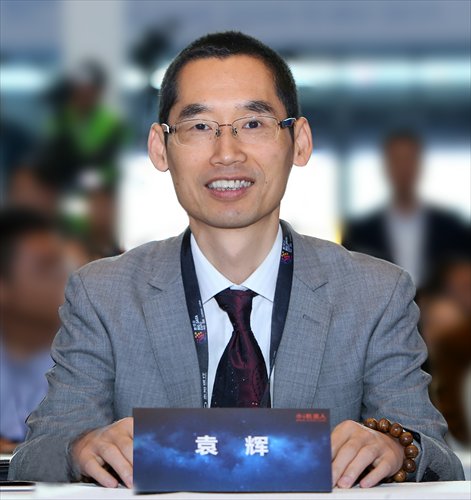HOME >> BUSINESS
China positioned well to ride wave of new tech developments
Source:Global Times Published: 2016/6/29 0:28:00
Editor's Note:
Speaking at this year's Summer Davos opening ceremony, Premier Li Keqiang put particular emphasis on cultivating China's new economy as the country moves ahead with economic restructuring, notably transformation and upgrade of traditional industries. The new economy featuring emerging new technologies and innovative applications of the Internet of Things is not simply seen as adding glamour to the venue of Summer Davos in Tianjin, with robot ladies on display that look a lot like real-life humans and headgear showcased which can control a ball using brainwaves, but powering the future of the Chinese economy. To figure out the true potential to tap in developing China's new economy as well as pitfalls to be avoided, Global Times reporter Li Qiaoyi sought opinions from several seasoned industry insiders during the just-concluded annual event that might serve to ignite a new economic boom in China.

China, US to fight AI battle
Yuan Hui
founder and CEO of Shanghai-based artificial intelligence firm Xiaoi,
While Google DeepMind's AlphaGo amazed the world after it defeated Go champion Lee Sedol earlier this year, it's a fact that China's indigenous artificial intelligence machines are not outsmarted by the high-profile Go-playing program.
Artificial intelligence essentially consists of three parts - technology and algorithms, accumulation of high quality data, and applications in specific sectors. The applause for the AlphaGo is mostly attributed to its achievement in playing Go after having accumulated tons of data in the field and enabling optimization via deep learning. But AlphaGo can't easily build its fame beyond Go-playing. In fact, China has developed and applied world-class artificial intelligence programs that can efficiently serve as customer service agents in many sectors, including telecom and banking.
The robotics sector is divided into two segments - industrial robots and service robots. With the Chinese economy shifting toward being powered by its services sector, it is well understood that the marketplace for service robots presents great potential. And given that building a truly intelligent service robot involves developing sensory perception, thinking ability and movement, apparently the key aspect in battling for artificial intelligent strengths is to figure out a way for robots to be able to think, albeit the other two facets are also indispensable. With overall trends in mind, it is believed that the future battle in the arena of artificial intelligence will be mostly fought between China and the US. Undeniably, the US remains unrivaled in terms of the power of artificial intelligence hardware, but China's strength in artificial intelligence applications in various sectors is also conspicuous, as the country has become perhaps the most mobile Internet savvy country after explosive growth over the years. Without any doubt, the brains of China's domestic artificial intelligence machines will be essentially homemade, laying the foundation for the country to be a superpower in the future world, maybe in just five to 10 years, surrounded by a wide range of diversified robots.

Data maturity, talent crucial
Dan DiFilippo
PwC's Global and US Data & Analytics leader,
Firstly, the data industry itself is more mature in some parts of the world than others. As China starts to build up that data capture capability, its statistics, the data, that is available here both publicly or privately, would be richer. As people start to become more mobile, start to transact in more digital ways, that will obviously enrich the data sets that are available to people. So I think one is the maturity of data and secondly talent is always the issue. Ten years ago, anywhere in the world, data analytic programs at universities would not have been so common, now they are becoming of course much more common. To the extent that China can ramp that up they will obviously be able to deliver on this as well and then understanding how analytics is used in the organization and who owns it. We see in many countries, companies wrestle with "If I create a team of data scientists, do I keep them centralized? What problems do they work on? Do I decentralize them and push them out of your organization?" So I think China inc. should think about how they utilize these skills, how they get them and keep them, and how to best utilize them. So those would be some of the considerations that would need to be addressed in order for China to capitalize on data opportunities. Start-up companies in China will be more used to using data. Practically, they are tech-enabled. They all have their advantages over other organizations. Obviously, there would be competition. There would be great incitement to leverage all the assets an organization may have. There would be a driver to help organizations beyond start-ups really become adept at dealing with data.
From a State-owned enterprises perspective, I would say for those companies that are in the frontline that are competing either nationally or with international rivals, they will be pushed to do this and those that maybe enjoy a more comfortable market position can still get there, but they have to rely on their innovative desires as opposed to competitive forces driving them to optimize as much as possible.

Sharing economy distant vision
Zhou Hang
CEO of Yidao, a major car-hailing service provider in China,
Objectively speaking, while China has obviously hitched a ride on the burgeoning sharing economy, a facet of the new economy that the premier has long had an optimistic view of, the sharing economy is seen only in the very early stage of its development. While the sharing economy is already much talked about, it's mainly taking shape in the arena of cars and homes and has yet to play its part in various other aspects of people's lives. It is fair to say that the sharing economy has a long way to go before it becomes economically mainstream.
Certainly, that also indicates the alluring prospect of developing the sharing economy in China. To grow the sharing economy, which to some extent could be dubbed as the unofficial economy as compared to its more orthodox counterpart that has dominated the industrial age, we need to be fully aware of the uniqueness of the unofficial economy and play to it. That means services enabled by the sharing economy must be more affordable compared to more traditional services, and also personalized as much as possible to woo consumers.
It needs to be noted that the new economy is about cultivating new types of businesses, for example, car-hailing services typifying the benefit of the sharing economy. Privately owned cars can be allowed to offer car-pooling and ride-sharing services as long as they are well-regulated, which means the car owners will need to apply for a license and buy more insurance. That will definitely be a good change. That said, some scandals that have hit the country's online peer-to-peer lending market, a vibrant part of the Internet finance space, shouldn't dent confidence in the infinite contributions to be made by the new economy.

Secondhand trade set to boom
Yao Jinbo
founder and CEO of 58.com, China's largest classifieds site,
While China's e-commerce boom has continued over the years, it's mainly about the trading of new products, while secondhand shopping online has yet to grow at scale. So far, the majority of domestic consumers haven't developed a habit of monetizing their used goods. However, with a rising number of domestic Internet firms starting to rethink used goods, it's time to expect a boom also in the thriving market for secondhand goods swapping.
To address consumers' pain points in engaging in buying used goods online, secondhand goods swapping apps can provide buyers with quality testing services through self-operated or third-party testing platforms. With China's exports, real estate and manufacturing sectors having lost steam after years of rapid expansion, it has been increasingly acknowledged that the arena of various life-related services is set to be the most vibrant and promising sector in the future, which will underpin the Chinese economy and on which the country's job market will rely. The expected boom in the country's online secondhand goods trading marketplace, in particular, will shift the economy to operate more efficiently and benefit its citizens with more affordable products.
Speaking at this year's Summer Davos opening ceremony, Premier Li Keqiang put particular emphasis on cultivating China's new economy as the country moves ahead with economic restructuring, notably transformation and upgrade of traditional industries. The new economy featuring emerging new technologies and innovative applications of the Internet of Things is not simply seen as adding glamour to the venue of Summer Davos in Tianjin, with robot ladies on display that look a lot like real-life humans and headgear showcased which can control a ball using brainwaves, but powering the future of the Chinese economy. To figure out the true potential to tap in developing China's new economy as well as pitfalls to be avoided, Global Times reporter Li Qiaoyi sought opinions from several seasoned industry insiders during the just-concluded annual event that might serve to ignite a new economic boom in China.

Yuan Hui Photo: Courtesy of Xiaoi
China, US to fight AI battle
Yuan Hui
founder and CEO of Shanghai-based artificial intelligence firm Xiaoi,
While Google DeepMind's AlphaGo amazed the world after it defeated Go champion Lee Sedol earlier this year, it's a fact that China's indigenous artificial intelligence machines are not outsmarted by the high-profile Go-playing program.
Artificial intelligence essentially consists of three parts - technology and algorithms, accumulation of high quality data, and applications in specific sectors. The applause for the AlphaGo is mostly attributed to its achievement in playing Go after having accumulated tons of data in the field and enabling optimization via deep learning. But AlphaGo can't easily build its fame beyond Go-playing. In fact, China has developed and applied world-class artificial intelligence programs that can efficiently serve as customer service agents in many sectors, including telecom and banking.
The robotics sector is divided into two segments - industrial robots and service robots. With the Chinese economy shifting toward being powered by its services sector, it is well understood that the marketplace for service robots presents great potential. And given that building a truly intelligent service robot involves developing sensory perception, thinking ability and movement, apparently the key aspect in battling for artificial intelligent strengths is to figure out a way for robots to be able to think, albeit the other two facets are also indispensable. With overall trends in mind, it is believed that the future battle in the arena of artificial intelligence will be mostly fought between China and the US. Undeniably, the US remains unrivaled in terms of the power of artificial intelligence hardware, but China's strength in artificial intelligence applications in various sectors is also conspicuous, as the country has become perhaps the most mobile Internet savvy country after explosive growth over the years. Without any doubt, the brains of China's domestic artificial intelligence machines will be essentially homemade, laying the foundation for the country to be a superpower in the future world, maybe in just five to 10 years, surrounded by a wide range of diversified robots.

Dan DiFilippo Photo: Courtesy of PwC
Data maturity, talent crucial
Dan DiFilippo
PwC's Global and US Data & Analytics leader,
Firstly, the data industry itself is more mature in some parts of the world than others. As China starts to build up that data capture capability, its statistics, the data, that is available here both publicly or privately, would be richer. As people start to become more mobile, start to transact in more digital ways, that will obviously enrich the data sets that are available to people. So I think one is the maturity of data and secondly talent is always the issue. Ten years ago, anywhere in the world, data analytic programs at universities would not have been so common, now they are becoming of course much more common. To the extent that China can ramp that up they will obviously be able to deliver on this as well and then understanding how analytics is used in the organization and who owns it. We see in many countries, companies wrestle with "If I create a team of data scientists, do I keep them centralized? What problems do they work on? Do I decentralize them and push them out of your organization?" So I think China inc. should think about how they utilize these skills, how they get them and keep them, and how to best utilize them. So those would be some of the considerations that would need to be addressed in order for China to capitalize on data opportunities. Start-up companies in China will be more used to using data. Practically, they are tech-enabled. They all have their advantages over other organizations. Obviously, there would be competition. There would be great incitement to leverage all the assets an organization may have. There would be a driver to help organizations beyond start-ups really become adept at dealing with data.
From a State-owned enterprises perspective, I would say for those companies that are in the frontline that are competing either nationally or with international rivals, they will be pushed to do this and those that maybe enjoy a more comfortable market position can still get there, but they have to rely on their innovative desires as opposed to competitive forces driving them to optimize as much as possible.

Zhou Hang Photo: Courtesy of Yidao
Sharing economy distant vision
Zhou Hang
CEO of Yidao, a major car-hailing service provider in China,
Objectively speaking, while China has obviously hitched a ride on the burgeoning sharing economy, a facet of the new economy that the premier has long had an optimistic view of, the sharing economy is seen only in the very early stage of its development. While the sharing economy is already much talked about, it's mainly taking shape in the arena of cars and homes and has yet to play its part in various other aspects of people's lives. It is fair to say that the sharing economy has a long way to go before it becomes economically mainstream.
Certainly, that also indicates the alluring prospect of developing the sharing economy in China. To grow the sharing economy, which to some extent could be dubbed as the unofficial economy as compared to its more orthodox counterpart that has dominated the industrial age, we need to be fully aware of the uniqueness of the unofficial economy and play to it. That means services enabled by the sharing economy must be more affordable compared to more traditional services, and also personalized as much as possible to woo consumers.
It needs to be noted that the new economy is about cultivating new types of businesses, for example, car-hailing services typifying the benefit of the sharing economy. Privately owned cars can be allowed to offer car-pooling and ride-sharing services as long as they are well-regulated, which means the car owners will need to apply for a license and buy more insurance. That will definitely be a good change. That said, some scandals that have hit the country's online peer-to-peer lending market, a vibrant part of the Internet finance space, shouldn't dent confidence in the infinite contributions to be made by the new economy.

Yao Jinbo Photo: Courtesy of 58.com
Secondhand trade set to boom
Yao Jinbo
founder and CEO of 58.com, China's largest classifieds site,
While China's e-commerce boom has continued over the years, it's mainly about the trading of new products, while secondhand shopping online has yet to grow at scale. So far, the majority of domestic consumers haven't developed a habit of monetizing their used goods. However, with a rising number of domestic Internet firms starting to rethink used goods, it's time to expect a boom also in the thriving market for secondhand goods swapping.
To address consumers' pain points in engaging in buying used goods online, secondhand goods swapping apps can provide buyers with quality testing services through self-operated or third-party testing platforms. With China's exports, real estate and manufacturing sectors having lost steam after years of rapid expansion, it has been increasingly acknowledged that the arena of various life-related services is set to be the most vibrant and promising sector in the future, which will underpin the Chinese economy and on which the country's job market will rely. The expected boom in the country's online secondhand goods trading marketplace, in particular, will shift the economy to operate more efficiently and benefit its citizens with more affordable products.
Posted in: Insider's Eye